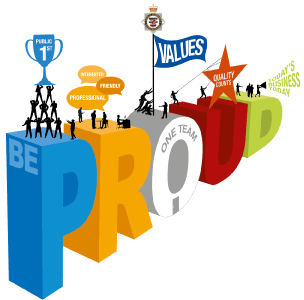Performance Review Reflection
Performance Review Reflection
A performance evaluation is an important tool for keeping communication flowing between teams. Periodic evaluation is a chance for managers and employees to review the recent past and discuss expectations moving forward. An evaluation also serves as an opportunity to set goals, both as individuals and teams.
Along with the performance evaluation often comes the self-assessment. An opportunity for employees to self-reflect and consider what their strengths and weaknesses are, self-assessments are not only important to growth as a worker but as a person. By critiquing their own work and behavior, employees can gain insight that helps them improve.
 For managers, self-assessments offer several benefits. They illuminate how the employee sees themselves in the context of the team and the organization at large. It also highlights any disagreements or misunderstandings between the manager and the employee. And, of course, self-assessments offer an opportunity for feedback to managers about what motivates and incentivizes an employee to do their best work.
For managers, self-assessments offer several benefits. They illuminate how the employee sees themselves in the context of the team and the organization at large. It also highlights any disagreements or misunderstandings between the manager and the employee. And, of course, self-assessments offer an opportunity for feedback to managers about what motivates and incentivizes an employee to do their best work.
 1. Be
proud.
One
major goal of the self-evaluation is to highlight your accomplishments and
recollect milestones in your professional development. A good self-assessment
should point to specific tasks and projects that highlight your best work. When
describing those accomplishments, employees should emphasize the impact those
achievements had on the whole business to emphasize their value to the company.
1. Be
proud.
One
major goal of the self-evaluation is to highlight your accomplishments and
recollect milestones in your professional development. A good self-assessment
should point to specific tasks and projects that highlight your best work. When
describing those accomplishments, employees should emphasize the impact those
achievements had on the whole business to emphasize their value to the company. Still,
it's important to not be self-deprecating in your assessment. Timothy Butler, a
senior fellow and director of career development programs at Harvard Business School, advised employees to use
developmental language when critiquing the areas in which they need to
improve.
Still,
it's important to not be self-deprecating in your assessment. Timothy Butler, a
senior fellow and director of career development programs at Harvard Business School, advised employees to use
developmental language when critiquing the areas in which they need to
improve.
3.
Continuously strive for growth.  It's
important during self-assessments to never stagnate; humans are constantly
adapting, learning and changing. Whether you've had a great year or fallen
short of your own expectations, it's important to remain committed to improving
and educating yourself. Taking a moment to list your goals and objectives for
the coming year during a self-assessment demonstrates that you are not content
to settle.
It's
important during self-assessments to never stagnate; humans are constantly
adapting, learning and changing. Whether you've had a great year or fallen
short of your own expectations, it's important to remain committed to improving
and educating yourself. Taking a moment to list your goals and objectives for
the coming year during a self-assessment demonstrates that you are not content
to settle.
5. Be
professional. "Use
examples to support your assertions, and … make sure that you spell and grammar
check your documents," Jones wrote in a blog post.
"These are all signs of how seriously you take the process and its
importance to you."
"Use
examples to support your assertions, and … make sure that you spell and grammar
check your documents," Jones wrote in a blog post.
"These are all signs of how seriously you take the process and its
importance to you."
Julie
Rieken, CEO of Applied Training Systems
Inc., said you should strive to connect your actions with a
manager's goals. This type of alignment is encouraging to any manager and
conveys that you understand your role within the larger context of the
company.
 It's
important during self-assessments to never stagnate; humans are constantly
adapting, learning and changing. Whether you've had a great year or fallen
short of your own expectations, it's important to remain committed to improving
and educating yourself. Taking a moment to list your goals and objectives for
the coming year during a self-assessment demonstrates that you are not content
to settle.
It's
important during self-assessments to never stagnate; humans are constantly
adapting, learning and changing. Whether you've had a great year or fallen
short of your own expectations, it's important to remain committed to improving
and educating yourself. Taking a moment to list your goals and objectives for
the coming year during a self-assessment demonstrates that you are not content
to settle. "Use
examples to support your assertions, and … make sure that you spell and grammar
check your documents," Jones wrote in a blog post.
"These are all signs of how seriously you take the process and its
importance to you."
"Use
examples to support your assertions, and … make sure that you spell and grammar
check your documents," Jones wrote in a blog post.
"These are all signs of how seriously you take the process and its
importance to you."
Comments
Post a Comment